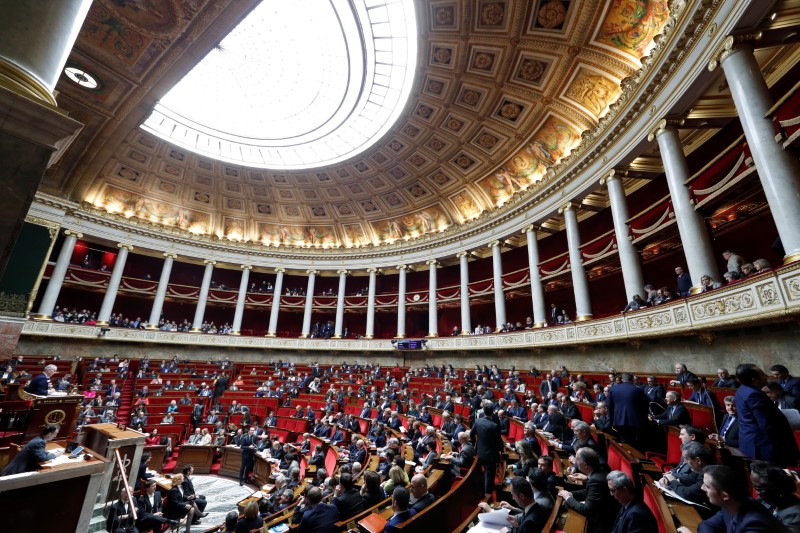PARIS (Reuters) - France's National Assembly on Wednesday approved a draft bill that would raise regulated minimum food prices and put curbs on supermarket promotions, legislation designed to increase farmers' income, improve food quality and fight waste.
The field-to-fork review was a campaign promise of President Emmanuel Macron to farmers who complain they bear the brunt of price wars between retailers.
The text, approved in the lower house after 77 hours of hard-fought debate, now goes to the Senate.
Here is a summary of the main measures adopted and some key amendments that were rejected.
APPROVED
* The government will be allowed to raise by decree the threshold below which retailers cannot sell food products by 10 percent. The increase in the Resale Below Cost threshold caters for the inclusion of additional costs such as retailer logistics and staff.
* The bill also empowers the government to curb promotional offers. Retailers will not be allowed to discount products by more than 34 percent of their value and sell more than 25 percent of a product's volume in a promotional offer.
This is to tackle aggressive price competition such as two-for-one discounts. Analysts say this could accelerate food inflation, potentially benefiting retailers' profit margins in the short-term.
The agriculture minister says farmers would see a "rebalancing" in margins further down the chain.
* From 2022, fifty percent of food products sold in canteens must be either organic or come from food chain meeting specific quality criteria.
* The government will also implement measures to reverse the process of determining prices by taking farmers' production costs as the starting point.
* Lawmakers adopted an amendment making "doggy bags", which allow restaurant-goers to leave with their leftovers, mandatory in from July 2021 in a bid to fight food waste.
REJECTED
* Glyphosate ban - A lawmaker close to Environment Minister Nicolas Hulot sought the inclusion of Macron's promise in 2017 to ban weed-killer glyphosate "at the latest within three years".
Farmers lobbied hard against the Glyphosate amendment, arguing three years was too soon to find an economic and environmentally viable alternative, and it was opposed robustly by Agriculture Minister Stephane Travert.
The exclusion is a political blow for Hulot, a former Green activist. Glyphosate was developed by Monsanto (N:MON) under the brand Roundup. A U.N. health agency said it caused cancer -- an allegation denied by Monsanto and dismissed by some studies.
Macron said in January he would never impose the ban if there was no credible alternative. Prime Minister Edouard Philippe on Wednesday said the three-year promise would be kept.
* Mandatory vegetarian menus in canteens.

* Mandatory video monitoring in slaughterhouses.